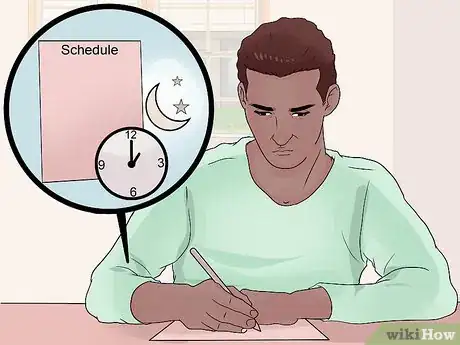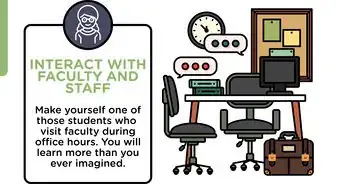This article was co-authored by Jeremy Bartz, PhD. Dr. Jeremy Bartz is a Clinical Psychologist in private practice based in Los Angeles, California. Dr. Bartz specializes in treating depression, anxiety, OCD, mind-body syndromes, chronic pain, insomnia, relationship difficulties, attachment trauma, and resolving the effects of narcissistic trauma. He received a Ph.D. in Counseling Psychology from Brigham Young University and completed a fellowship In Pain Psychology at Stanford's premier pain management clinic.
There are 13 references cited in this article, which can be found at the bottom of the page.
wikiHow marks an article as reader-approved once it receives enough positive feedback. This article received 23 testimonials and 90% of readers who voted found it helpful, earning it our reader-approved status.
This article has been viewed 206,633 times.
Staying up all night to do homework is not advised, but sometimes it’s unavoidable. If your homework has piled up to the point that the only way to complete it is to pull an all-nighter, then make some preparations and get your head in the game. You’re in for a long night.
Steps
Getting Organized Before Your All-Nighter
-
1Create a workspace. Find a place in your house that’s clean, organized and free from distractions. The space should be comfortable, but not so comfortable that you could easily fall asleep there.[1]
- Make sure you have all the resources you’ll need –all your books, assignments and stationery.
- If it helps you to have music playing as you work, work near a speaker. But choose instrumental music to avoid being distracted by focusing on the song lyrics instead of your assignments.
-
2Gather your fuel. Staying up all night is an endurance event, so you’ll need to fuel yourself accordingly. Make sure your fridge and pantry are stocked with food, water, milk and your favorite caffeinated beverage, like coffee, tea, energy drinks or soda.[2]
- Feed your body protein rich foods, like peanut butter sandwiches, turkey sandwiches or hummus and carrots.
- Stay away from sweets; the sugar will cause you to crash.
Advertisement -
3Prioritize your work. If you’re staying up all night, you have a lot of work to do, but not all of it necessarily needs to be done by the next day. Make a list of all your assignments, then figure out which assignments are most pressing.[3]
- Put the biggest assignments that are due first near the top of the list.
- Put smaller assignments that you can complete quickly and easily near the bottom of the list. Try to do these towards the end of your night when you’re exhausted.
- Any assignment that isn’t due the next day should be completed on another night.
-
4Create a schedule. Figure out what time you need to complete your work by. If you have school the next day, you’ll need some time in the morning to shower and prepare, so factor in an hour to get ready. Then work backwards and schedule out your night.[4]
- Approximate how long each assignment will take you and then block off an appropriate amount of time in your night to do the work.
- Schedule high priority assignments early in the evening, when you’re still at your best.
- Schedule in a ten minute break every two hours. Use this time to get up and walk around and give your brain a break.
-
5Pump yourself up with a nap. If you’re tired before starting your work, take a caffeine nap. Drink a cup of coffee, then immediately take a 20-minute nap. The caffeine will take effect just as you wake up and you’ll feel refreshed and energized.[5]
- Don’t nap for longer than 30 minutes. If you nap for longer than 30, you risk entering into REM sleep cycle.
- If you don’t have time for a nap, take a fifteen-minute walk outside. It will accomplish the same thing.
-
6Start as soon as you can. If you’re planning an all-nighter, it’s because you’re crunched for time, but don’t make it any more difficult on yourself than it has to be. Start working as soon as you can, and don’t put the work off till later in the night.[6]
- Make a concrete plan of what time you’re going to begin working and stick to it. Set an alarm, if you have to.
- Turn off your phone and any other distractions that might impede you from beginning your work.
Executing Your All-Nighter
-
1Begin your caffeine cycle. As you start working, drink one of the caffeinated beverages you have set aside. Drink it slowly, so the caffeine doesn't overwhelm your system and cause you to crash.[7]
- For every caffeinated beverage you drink, drink a cup of water.
- As the night goes on, increase the time between caffeinated beverages.
- If you feel yourself falling into a slump, take a multivitamin.
-
2Take a break for exercise. No matter how focused you are, at some point, your brain will hit a wall. Instead of working through the slump at your computer, use this time to get in some exercise.[8]
- A quick workout can boost your brain's ability to learn and retain information, which will help you break through your slump.
- Don’t do a full workout – instead, do some quick exercise in the form of 10 pushups, 10 jumping jacks or 10 sit ups.
-
3Keep from falling asleep by making yourself uncomfortable. Pain stimulates the brain and keeps you from falling asleep. When you feel yourself nodding off, try pinching your thigh or eyebrow to give yourself a quick jolt.[9]
- If pinching isn’t cutting it, splash cold water on your face for an added boost.
- Lower the thermostat in your house or study area to keep your body alert.
- Take a cold shower to freeze yourself awake.
-
4Keep the lights turned on. Melatonin, the hormone that makes humans sleepy, is brought on by darkness, so turn on your brightest lights. Try to work in a room with fluorescent lighting, if possible.[10]
- The closer the light is to your eyes, the better, so try to work near a desk lamp or computer screen.
- Change rooms every couple of hours so your eyes don’t have time to fully adjust to the bright lights.
-
5Chew gum. Mint increases brain activity and improves memory, so chewing gum and sucking on mint candies can help you increase your alertness and improve the quality of your work.[11]
- Keep a stash close to your desk and dip into it whenever you feel yourself slowing down.
- Drinking mint tea is also a great way to get some added caffeine.
Staying Motivated During Your All-Nighter
-
1Invite a friend to join you. Misery loves company, so inviting a friend to spend the evening with you is a great way of holding yourself accountable. Inviting a friend who has similar assignments to yours is even better; you’ll be able to help each other out with the work.[12]
- Don’t invite over a friend who only wants to talk and hang out. You need someone who will motivate you, not distract you.
-
2Stay focused. The best thing you can do for your all-nighter is to remove any potential impediments. Turn off your phone, move out of the room with the TV in it and stay away from the Internet as much as possible.
- If you know you can’t go all night without checking Facebook, deactivate your account for the night. You can reactivate it as soon as all your work is done.
- Give your social media passwords to a friend or parent for the evening so you can’t break in to check your accounts.
-
3Don’t try to multi-task. Staying up all night is already challenging enough – it won’t help you to try to work on more than one assignment simultaneously. Stick to the schedule you created earlier and don’t jump around between assignments.
- Use your priority list from earlier, cross each item off the list when it’s completed, then move on to the next one.
-
4Set up a system of rewards. Staying up all night is hard and you deserve a reward for doing so. The reward can be big, like buying a new shirt or DVD for completing all your work. Or you can reward yourself intermittently throughout the night.[13]
- Every time you finish an assignment, throw a five minute dance party. You’ll get some exercise in and you can listen to your favorite song.
- Give yourself five minutes to check your phone after completing an item on your to-do list.
-
5Take breaks. When you're working hard, taking a break might seem counterintuitive, but it's actually very important. Breaks keep you from getting bored, help you retain information and give you a moment to evaluate your work from afar.[14]
- Take 10 - 15 minutes every two hours to grab a snack or take a walk.
- If you feel overwhelmed, take a 10 minute break to meditate.
Expert Q&A
-
QuestionWhat will happen if I miss an entire night's sleep?
 Jeremy Bartz, PhDDr. Jeremy Bartz is a Clinical Psychologist in private practice based in Los Angeles, California. Dr. Bartz specializes in treating depression, anxiety, OCD, mind-body syndromes, chronic pain, insomnia, relationship difficulties, attachment trauma, and resolving the effects of narcissistic trauma. He received a Ph.D. in Counseling Psychology from Brigham Young University and completed a fellowship In Pain Psychology at Stanford's premier pain management clinic.
Jeremy Bartz, PhDDr. Jeremy Bartz is a Clinical Psychologist in private practice based in Los Angeles, California. Dr. Bartz specializes in treating depression, anxiety, OCD, mind-body syndromes, chronic pain, insomnia, relationship difficulties, attachment trauma, and resolving the effects of narcissistic trauma. He received a Ph.D. in Counseling Psychology from Brigham Young University and completed a fellowship In Pain Psychology at Stanford's premier pain management clinic.
Clinical Psychologist You'll probably feel tired and sluggish the next day, but as long as you push through and avoid napping during the day, you'll get a deep, good night's sleep the next night.
You'll probably feel tired and sluggish the next day, but as long as you push through and avoid napping during the day, you'll get a deep, good night's sleep the next night. -
QuestionHow do I not feel sleepy the next day if I pull an all-nighter?
 Community AnswerEat some fruit for breakfast (not cherries, they contain melatonin). Then, wash your face with cold water or take a cold shower. Exercise can also get your endorphins going to give you more energy.
Community AnswerEat some fruit for breakfast (not cherries, they contain melatonin). Then, wash your face with cold water or take a cold shower. Exercise can also get your endorphins going to give you more energy. -
QuestionIs eating apples a good idea? I've heard it works just as well as caffeine.
 Community AnswerApples are a great homework snack, as they release vitamins and energy slowly to keep you powering through worksheet after worksheet. No caffeine crashes to worry about either!
Community AnswerApples are a great homework snack, as they release vitamins and energy slowly to keep you powering through worksheet after worksheet. No caffeine crashes to worry about either!
Warnings
- Staying up for too long can be dangerous. Do not stay awake for longer than 36 hours consecutively. Disregarding this advice can lead to sickness and possible death.⧼thumbs_response⧽
- If you know you have this much homework, start it as early as possible or during lunch or other down times at school. Starting the homework at 4:00 PM is better than doing it at 4:00 AM!⧼thumbs_response⧽
References
- ↑ https://www.uopeople.edu/blog/find-a-quiet-place-to-study/
- ↑ https://au.reachout.com/articles/foods-that-help-our-brain-study
- ↑ https://www.fnu.edu/7-techniques-improve-study-habits/
- ↑ https://learningcenter.unc.edu/tips-and-tools/studying-101-study-smarter-not-harder/
- ↑ https://www.hsph.harvard.edu/nutritionsource/food-features/coffee/
- ↑ https://www.apu.edu/articles/6-crucial-study-habits-for-college-students/
- ↑ https://www.hsph.harvard.edu/nutritionsource/food-features/coffee/
- ↑ https://www.helpguide.org/articles/healthy-living/how-to-start-exercising-and-stick-to-it.htm
- ↑ https://students.ubc.ca/ubclife/pull-all-nighter-if-you-have
- ↑ https://healthysleep.med.harvard.edu/healthy/matters/benefits-of-sleep/learning-memory
- ↑ https://www.psychologytoday.com/us/blog/finding-new-home/201905/chew-or-not-chew-gum-when-studying
- ↑ https://www.fnu.edu/10-reasons-form-study-group/
- ↑ https://psychcentral.com/blog/psychology-rewarding-yourself-with-treats
- ↑ https://www.psychologytoday.com/us/blog/your-future-self/201804/giving-yourself-break
About This Article
If you need to stay up all night doing homework, there are a few ways to help you stay as productive as possible. First, break down your work into smaller tasks and write a schedule to cover everything. Make sure you take regular breaks to walk around and refresh yourself. You should also turn off your phone, log out of your social media accounts, and avoid any other distractions to help you focus. Keep the main lights on in your room and open a window, which will help you stay awake. You’ll probably need caffeine and some healthy snacks, like fruit and nuts, to keep you going. Just make sure you spread them out over the night so you don’t crash after a few hours. For more study tips, including how to do a coffee nap to wake yourself up, read on!














































































